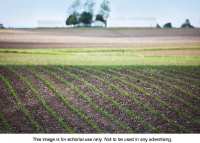Understanding Crop Rotation

Posted by peter88
from the Agriculture category at
13 Jul 2011 09:28:30 pm.

While farming might once have been a part of most Americans' daily lives, today the principles of farming are much more foreign to the average American. One such principle is crop rotation, a valuable agricultural practice that can even pay dividends for suburban homeowners who enjoy gardening. The benefits of crop rotation aren't only applicable to large farms, as they can help keep personal gardens healthy as well.
What Is Crop Rotation?
Crop rotation is a practice farmers employ to help their crops fight disease. By growing a variety of crops in a sequential system throughout their field, farmers are hoping to avoid the buildup of disease and pests that is common with mono-cropping, which is the practice of growing the same crop on the same land year after year after year. When rotating crops, each succeeding crop must belong to a family different from the previous crop.
Why Employ Crop Rotation?
Crop rotation has many benefits, arguably the most important of which is keeping pests and disease at bay. Since many pest insects and disease-causing organisms are host specific, rotating crops helps ensure these insect pests and harmful organisms cannot make a permanent home or have access to a permanent source of food. If crops aren't rotated, then the insect pests and organisms have a constant source of food, enabling them to live longer and do more damage to crops as a result.
But crop rotation isn't only beneficial to crops. Crop rotation can also promote healthy soil. Different crops have different nutrient needs, so rotating crops with different nutrient needs helps avoid the depletion of any one element present in the soil. Soil structure is often better when crops are rotated as well. Some crops are deep-rooting while others are shallow rooting. By alternating between the two, planters can break up any subsoil that might have grown compacted.
Crop rotation also offers environmental and financial benefits by reducing reliance on synthetic chemicals to fight pests. By rotating crops, planters are making it much harder for pests to thrive, without having to spend money on costly and often environmentally harmful pesticides.
0 Comments



